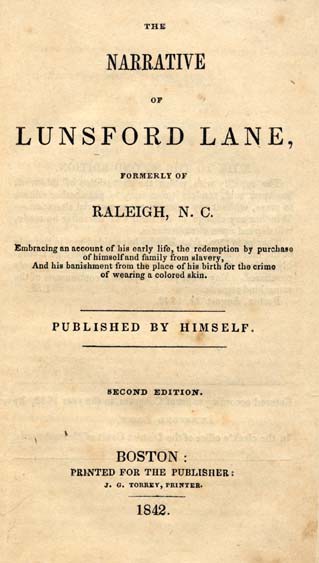On May 30, 1803, Lunsford Lane was born into slavery in the household of Sherwood Haywood, a Raleigh banker.
The Haywoods acknowledged Lane's ambition and talent for business. As a boy he began to pursue entrepreneurial ventures in Raleigh. He developed a variety of enterprises that included selling commodities he kept in a rented warehouse and operating a successful tobacco business where he invented a unique pipe and popular tobacco blend.
Savings enabled him to purchase his freedom in 1835 and move to Massachusetts where he published The Narrative of Lunsford Lane. There he worked to raise money to free his family.

Lane’s 1842 Narrative provides an account of the extremely rare occurrence of an enslaved man who managed to develop a highly successful business despite the impossible constraints of a legal and social system that took away his right to the products of his own mind and time.
Lane’s story recounts his awareness of the need to be invisible and play within the rules and yet his growing disillusionment with the immoral legal and social system that conspired against him, even after he purchased his freedom.
Returning to Raleigh in 1839 as a free man, he purchased a home and continued his tobacco business aiming to free his family. He was soon banished by a law preventing the immigration of free blacks into the state. Returning again in 1842 to free his family, he was arrested for being an abolitionist.
Lane eventually freed his wife, mother and seven children, and the family made their way to Massachusetts where Lane spent the rest of his life working and lecturing on abolition. He died around 1863, although the location is unknown.
Lane’s book is available online through the Documenting the American South Project at UNC-Chapel Hill.
Other related resources:
- Images related to civil rights from the State Archives
Images from North Carolina Office of Archives and History and UNC-Chapel Hill Libraries.

